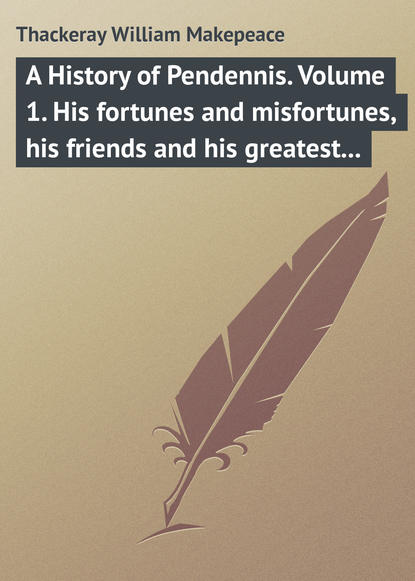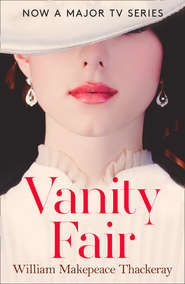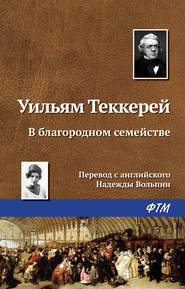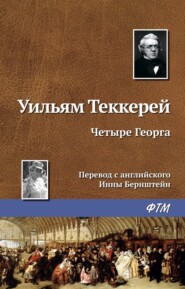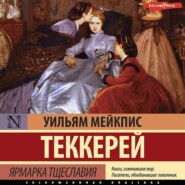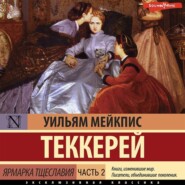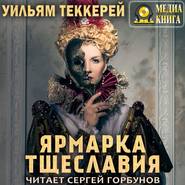По всем вопросам обращайтесь на: info@litportal.ru
(©) 2003-2024.
✖
A History of Pendennis. Volume 1. His fortunes and misfortunes, his friends and his greatest enemy
Настройки чтения
Размер шрифта
Высота строк
Поля
About the time of Mrs. Pendennis's demise, another of her son's patients likewise died at Bath; that virtuous woman, old Lady Pontypool, daughter of Reginald twelfth Earl of Bareacres, and by consequence great grand aunt to the present earl, and widow of John second Lord Pontypool, and likewise of the Reverend Jonas Wales, of the Armageddon Chapel, Clifton. For the last five years of her life her ladyship had been attended by Miss Helen Thistlewood, a very distant relative of the noble house of Bareacres, before mentioned, and daughter of Lieutenant R. Thistlewood, R. N., killed at the battle of Copenhagen. Under Lady Pontypool's roof Miss Thistlewood found a comfortable shelter, as far as boarding and lodging went, but suffered under such an infernal tyranny as only women can inflict on, or bear from, one another; the doctor, who paid his visits to my Lady Pontypool at least twice a day, could not but remark the angelical sweetness and kindness with which the young lady bore her elderly relative's insults; and it was, as they were going in the fourth mourning coach to attend her ladyship's venerated remains to Bath Abbey, where they now repose, that he looked at her sweet pale face, and resolved upon putting a certain question to her, the very nature of which made his pulse beat ninety, at least.
He was older than she by more than twenty years, and at no time the most ardent of men. Perhaps he had had a love affair in early life which he had to strangle – perhaps all early love affairs ought to be strangled or drowned, like so many blind kittens: well, at three-and-forty he was a collected quiet little gentleman in black stockings, with a bald head, and a few days after the ceremony he called to see her, and, as he felt her pulse, he kept hold of her hand in his, and asked her where she was going to live now that the Pontypool family had come down upon the property, which was being nailed into boxes, and packed into hampers, and swaddled up with haybands, and buried in straw, and locked under three keys in green-baize plate-chests, and carted away under the eyes of poor Miss Helen – he asked her where she was going to live finally.
Her eyes filled with tears, and she said she did not know. She had a little money. The old lady had left her a thousand pounds, indeed; and she would go into a boarding-house or into a school; in fine, she did not know where.
Then Pendennis, looking into her pale face, and keeping hold of her cold little hand, asked her if she would come and live with him? He was old compared to – to so blooming a young lady as Miss Thistlewood (Pendennis was of the grave old complimentary school of gentlemen and apothecaries), but he was of good birth, and, he flattered himself, of good principles and temper. His prospects were good, and daily mending. He was alone in the world, and had need of a kind and constant companion, whom it would be the study of his life to make happy; in a word, he recited to her a little speech, which he had composed that morning in bed, and rehearsed and perfected in his carriage, as he was coming to wait upon the young lady.
Perhaps if he had had an early love-passage, she too had one day hoped for a different lot than to be wedded to a little gentleman who rapped his teeth and smiled artificially, who was laboriously polite to the butler as he slid up stairs into the drawing-room, and profusely civil to the lady's-maid, who waited at the bed-room door; for whom her old patroness used to ring as for a servant, and who came with even more eagerness; who got up stories, as he sent in draughts, for his patient's amusement and his own profit: perhaps she would have chosen a different man – but she knew, on the other hand, how worthy Pendennis was, how prudent, how honorable; how good he had been to his mother, and constant in his care of her; and the upshot of this interview was, that she, blushing very much, made Pendennis an extremely low courtesy, and asked leave to – to consider his very kind proposal.
They were married in the dull Bath season, which was the height of the season in London. And Pendennis having previously, through a professional friend, M.R.C.S., secured lodgings in Holles-street, Cavendish Square, took his wife thither in a chaise and pair; conducted her to the theaters, the Parks, and the Chapel Royal; showed her the folks going to a drawing-room, and, in a word, gave her all the pleasures of the town. He likewise left cards upon Lord Pontypool, upon the Right Honorable the Earl of Bareacres, and upon Sir Pepin and Lady Ribstone, his earliest and kindest patrons. Bareacres took no notice of the cards. Pontypool called, admired Mrs. Pendennis, and said Lady Pontypool would come and see her, which her ladyship did, per proxy of John her footman, who brought her card, and an invitation to a concert five weeks off. Pendennis was back in his little one-horse carriage, dispensing draughts and pills at that time: but the Ribstones asked him and Mrs. Pendennis to an entertainment, of which Mr. Pendennis bragged to the last day of his life.
The secret ambition of Mr. Pendennis had always been to be a gentleman. It takes much time and careful saving for a provincial doctor, whose gains are not very large, to lay by enough money wherewith to purchase a house and land: but besides our friend's own frugality and prudence, fortune aided him considerably in his endeavor, and brought him to the point which he so panted to attain. He laid out some money very advantageously in the purchase of a house and small estate close upon the village of Clavering before mentioned. Words can not describe, nor did he himself ever care to confess to any one, his pride when he found himself a real landed proprietor, and could walk over acres of which he was the master. A lucky purchase which he had made of shares in a copper-mine added very considerably to his wealth, and he realized with great prudence while this mine was still at its full vogue. Finally, he sold his business, at Bath, to Mr. Parkins, for a handsome sum of ready money, and for an annuity to be paid to him during a certain number of years after he had forever retired from the handling of the mortar and pestle.
Arthur Pendennis, his son, was eight years old at the time of this event, so that it is no wonder that the latter, who left Bath and the surgery so young, should forget the existence of such a place almost entirely, and that his father's hands had ever been dirtied by the compounding of odious pills, or the preparation of filthy plasters. The old man never spoke about the shop himself, never alluded to it; called in the medical practitioner of Clavering to attend his family when occasion arrived; sunk the black breeches and stockings altogether; attended market and sessions, and wore a bottle-green coat and brass buttons with drab gaiters, just as if he had been an English gentleman all his life. He used to stand at his lodge-gate, and see the coaches come in, and bow gravely to the guards and coachmen as they touched their hats and drove by. It was he who founded the Clavering Book Club; and set up the Samaritan Soup and Blanket Society. It was he who brought the mail, which used to run through Cacklefield before, away from that village and through Clavering. At church he was equally active as a vestryman and a worshiper. At market every Thursday, he went from pen to stall, looked at samples of oats, and munched corn, felt beasts, punched geese in the breast, and weighed them with a knowing air, and did business with the farmers at the Clavering Arms, as well as the oldest frequenter of that house of call. It was now his shame, as it formerly was his pride, to be called doctor, and those who wished to please him always gave him the title of squire.
Heaven knows where they came from, but a whole range of Pendennis portraits presently hung round the doctor's oak dining-room; Lelys and Vandykes he vowed all the portraits to be, and when questioned as to the history of the originals, would vaguely say they were "ancestors of his." You could see by his wife's looks that she disbelieved in these genealogical legends, for she generally endeavored to turn the conversation when he commenced them. But his little boy believed them to their fullest extent, and Roger Pendennis of Agincourt, Arthur Pendennis of Crecy, General Pendennis of Blenheim and Oudenarde, were as real and actual beings for this young gentleman as – whom shall we say? – as Robinson Crusoe, or Peter Wilkins, or the Seven Champions of Christendom, whose histories were in his library.
Pendennis's fortune, which, at the best, was not above eight hundred pounds a year, did not, with the best economy and management, permit of his living with the great folks of the county; but he had a decent comfortable society of the second-best sort. If they were not the roses, they lived near the roses, as it were, and had a good deal of the odor of genteel life. They had out their plate, and dined each other round in the moonlight nights twice a year, coming a dozen miles to these festivals; and besides the county, the Pendennises had the society of the town of Clavering, as much as, nay, more than they liked: for Mrs. Pybus was always poking about Helen's conservatories, and intercepting the operation of her soup-tickets and coal-clubs: Captain Glanders (H. P., 50th Dragoon Guards), was forever swaggering about the squire's stables and gardens, and endeavoring to enlist him in his quarrels with the vicar, with the postmaster, with the Reverend F. Wapshot of Clavering Grammar School, for overflogging his son, Anglesea Glanders – with all the village, in fine. And Pendennis and his wife often blessed themselves, that their house of Fairoaks was nearly a mile out of Clavering, or their premises would never have been free from the prying eyes and prattle of one or other of the male and female inhabitants there.
Fairoaks lawn comes down to the little river Brawl, and on the other side were the plantations and woods (as much as were left of them) of Clavering Park, Sir Francis Clavering, Bart. The park was let out in pasture and fed down by sheep and cattle, when the Pendennises came first to live at Fairoaks. Shutters were up in the house; a splendid freestone palace, with great stairs, statues, and porticos, whereof you may see a picture in the "Beauties of England and Wales." Sir Richard Clavering, Sir Francis's grandfather, had commenced the ruin of the family by the building of this palace; his successor had achieved the ruin by living in it. The present Sir Francis was abroad somewhere; nor could any body be found rich enough to rent that enormous mansion, through the deserted rooms, moldy clanking halls, and dismal galleries of which, Arthur Pendennis many a time walked trembling when he was a boy. At sunset, from the lawn of Fairoaks, there was a pretty sight: it and the opposite park of Clavering were in the habit of putting on a rich golden tinge, which became them both wonderfully. The upper windows of the great house flamed so as to make your eyes wink; the little river ran off noisily westward, and was lost in a somber wood, behind which the towers of the old abbey church of Clavering (whereby that town is called Clavering St. Mary's to the present day) rose up in purple splendor. Little Arthur's figure and his mother's, cast long blue shadows over the grass; and he would repeat in a low voice (for a scene of great natural beauty always moved the boy, who inherited this sensibility from his mother) certain lines beginning, "These are thy glorious works, Parent of Good; Almighty! thine this universal frame," greatly to Mrs. Pendennis's delight. Such walks and conversation generally ended in a profusion of filial and maternal embraces; for to love and to pray were the main occupations of this dear woman's life; and I have often heard Pendennis say in his wild way, that he felt that he was sure of going to heaven, for his mother never could be happy there without him.
As for John Pendennis, as the father of the family, and that sort of thing, every body had the greatest respect for him; and his orders were obeyed like those of the Medes and Persians. His hat was as well brushed, perhaps, as that of any man in this empire. His meals were served at the same minute every day, and wo to those who came late, as little Pen, a disorderly little rascal, sometimes did. Prayers were recited, his letters were read, his business dispatched, his stables and garden inspected, his hen-houses and kennel, his barn and pigstye visited, always at regular hours. After dinner he always had a nap with the Globe newspaper on his knee, and his yellow bandanna handkerchief on his face (Major Pendennis sent the yellow handkerchiefs from India, and his brother had helped in the purchase of his majority, so that they were good friends now). And so, as his dinner took place at six o'clock to a minute, and the sunset business alluded to may be supposed to have occurred at about half-past seven, it is probable that he did not much care for the view in front of his lawn windows, or take any share in the poetry and caresses which were taking place there.
They seldom occurred in his presence. However frisky they were before, mother and child were hushed and quiet when Mr. Pendennis walked into the drawing room, his newspaper under his arm. And here, while little Pen, buried in a great chair, read all the books of which he could lay hold, the squire perused his own articles in the "Gardener's Gazette," or took a solemn hand at picquet with Mrs. Pendennis, or an occasional friend from the village.
Pendennis usually took care that at least one of his grand dinners should take place when his brother, the major, who, on the return of his regiment from India and New South Wales, had sold out and gone upon half-pay, came to pay his biennial visit to Fairoaks. "My brother, Major Pendennis," was a constant theme of the retired doctor's conversation. All the family delighted in my brother the major. He was the link which bound them to the great world of London, and the fashion. He always brought down the last news of the nobility, and was in the constant habit of dining with lords and great folks. He spoke of such with soldier-like respect and decorum. He would say, "My Lord Bareacres has been good enough to invite me to Bareacres for the pheasant shooting," or, "My Lord Steyne is so kind as to wish for my presence at Stillbrook for the Easter holidays;" and you may be sure the whereabouts of my brother the major was carefully made known by worthy Mr. Pendennis to his friends at the Clavering reading-room, at justice-meetings, or at the county town. Their carriages would come from ten miles round to call upon Major Pendennis in his visits to Fairoaks; the fame of his fashion as a man about town was established throughout the county. There was a talk of his marrying Miss Hunkle, of Lilybank, old Hunkle the attorney's daughter, with at least fifteen hundred a year to her fortune: but my brother the major refused this negotiation, advantageous as it might seem to most persons. "As a bachelor," he said, "nobody cares how poor I am. I have the happiness to live with people who are so highly placed in the world, that a few hundreds or thousands a year more or less can make no difference in the estimation in which they are pleased to hold me. Miss Hunkle, though a most respectable lady, is not in possession of either the birth or the manners, which would entitle her to be received into the sphere in which I have the honor to move. I shall live and die an old bachelor, John: and your worthy friend, Miss Hunkle, I have no doubt, will find some more worthy object of her affection, than a worn-out old soldier on half-pay." Time showed the correctness of the surmise of the old man of the world; Miss Hunkle married a young French nobleman, and is now at this moment living at Lilybank, under the title of Baroness de Carambole, having been separated from her wild young scapegrace of a baron very shortly after their union.
The major was a great favorite with almost all the little establishment of Fairoaks. He was as good-natured as he was well bred, and had a sincere liking and regard for his sister-in-law, whom he pronounced, and with perfect truth, to be as fine a lady as any in England, and an honor to the family. Indeed, Mrs. Pendennis's tranquil beauty, her natural sweetness and kindness, and that simplicity and dignity which a perfect purity and innocence are sure to bestow upon a handsome woman, rendered her quite worthy of her brother's praises. I think it is not national prejudice which makes me believe that a high-bred English lady is the most complete of all Heaven's subjects in this world. In whom else do you see so much grace and so much virtue; so much faith and so much tenderness; with such a perfect refinement and chastity? And by high-bred ladies I don't mean duchesses and countesses. Be they ever so high in station, they can be but ladies, and no more. But almost every man who lives in the world has the happiness, let us hope, of counting a few such persons among his circle of acquaintance – women in whose angelical natures, there is something awful as well as beautiful, to contemplate; at whose feet the wildest and fiercest of us must fall down and humble ourselves; – in admiration of that adorable purity which never seems to do or to think wrong.
Arthur Pendennis had the good fortune to have a mother endowed with those happy qualities. During his childhood and youth, the boy thought of her as little less than an angel – as a supernatural being, all wisdom, love, and beauty. When her husband drove her into the county town, or to the assize balls or concerts there, he would step into the assembly with his wife on his arm, and look the great folks in the face, as much as to say, "Look at that, my lord; can any of you show me a woman like that?" She enraged some country ladies with three times her money, by a sort of desperate perfection which they found in her. Miss Pybus said she was cold and haughty; Miss Pierce, that she was too proud for her station; Mrs. Wapshot as a doctor of divinity's lady, would have the pas of her, who was only the wife of a medical practitioner. In the mean while, this lady moved through the world quite regardless of all the comments that were made in her praise or disfavor. She did not seem to know that she was admired or hated for being so perfect: but carried on calmly through life, saying her prayers, loving her family, helping her neighbors, and doing her duty.
That even a woman should be faultless, however, is an arrangement not permitted by nature, which assigns to us mental defects, as it awards to us headaches, illnesses, or death; without which, the scheme of the world could not be carried on – nay, some of the best qualities of mankind could not be brought into exercise. As pain produces or elicits fortitude and endurance; difficulty, perseverance; poverty, industry and ingenuity; danger, courage and what not; so the very virtues, on the other hand, will generate some vices: and, in fine, Mrs. Pendennis had that vice which Miss Pybus and Miss Pierce discovered in her, namely, that of pride; which did not vest itself so much in her own person, as in that of her family. She spoke about Mr. Pendennis (a worthy little gentleman enough, but there are others as good as he) with an awful reverence, as if he had been the Pope of Rome on his throne, and she a cardinal kneeling at his feet and giving him incense. The major she held to be a sort of Bayard among majors: and as for her son, Arthur, she worshiped that youth with an ardor which the young scapegrace accepted almost as coolly as the statue of the saint in Saint Peter's receives the rapturous osculations which the faithful deliver on his toe.
This unfortunate superstition and idol-worship of this good woman was the cause of a great deal of the misfortune which befell the young gentleman who is the hero of this history, and deserves therefore to be mentioned at the outset of his story.
Arthur Pendennis's schoolfellows at the Greyfriars School state that, as a boy, he was in no ways remarkable either as a dunce or as a scholar. He did, in fact, just as much as was required of him, and no more. If he was distinguished for any thing it was for verse-writing; but was his enthusiasm ever so great, it stopped when he had composed the number of lines demanded by the regulations (unlike young Swettenham, for instance, who, with no more of poetry in his composition than Mr. Wakley, yet would bring up a hundred dreary hexameters to the master after a half-holiday; or young Fluxmore, who not only did his own verses, but all the fifth form's besides). He never read to improve himself out of school-hours, but, on the contrary, devoured all the novels, plays, and poetry, on which he could lay his hands. He never was flogged, but it was a wonder how he escaped the whipping-post. When he had money he spent it royally in tarts for himself and his friends; he has been known to disburse nine and sixpence out of ten shillings awarded to him in a single day. When he had no funds he went on tick. When he could get no credit he went without, and was almost as happy. He has been known to take a thrashing for a crony without saying a word; but a blow, ever so slight, from a friend, would make him roar. To fighting he was averse from his earliest youth, as indeed to physic, the Greek Grammar, or any other exertion, and would engage in none of them, except at the last extremity. He seldom, if ever, told lies, and never bullied little boys. Those masters or seniors who were kind to him, he loved with boyish ardor. And though the doctor, when he did not know his Horace, or could not construe his Greek play, said that that boy Pendennis was a disgrace to the school, a candidate for ruin in this world, and perdition in the next; a profligate who would most likely bring his venerable father to ruin and his mother to a dishonored grave, and the like – yet as the doctor made use of these compliments to most of the boys in the place (which has not turned out an unusual number of felons and pick-pockets), little Pen, at first uneasy and terrified by these charges, became gradually accustomed to hear them; and he has not, in fact, either murdered his parents, or committed any act worthy of transportation or hanging up to the present day.
There were many of the upper boys, among the Cistercians with whom Pendennis was educated, who assumed all the privileges of men long before they quitted that seminary. Many of them, for example, smoked cigars – and some had already begun the practice of inebriation. One had fought a duel with an ensign in a marching regiment in consequence of a row at the theater – another actually kept a buggy and horse at a livery stable in Covent Garden, and might be seen driving any Sunday in Hyde Park with a groom with squared arms and armorial buttons by his side. Many of the seniors were in love, and showed each other in confidence poems addressed to, or letters and locks of hair received from, young ladies – but Pen, a modest and timid youth, rather envied these than imitated them as yet. He had not got beyond the theory as yet – the practice of life was all to come. And, by the way, ye tender mothers and sober fathers of Christian families, a prodigious thing that theory of life is as orally learned at a great public school. Why, if you could hear those boys of fourteen who blush before mothers and sneak off in silence in the presence of their daughters, talking among each other – it would be the woman's turn to blush then. Before he was twelve years old and while his mother fancied him an angel of candor, little Pen had heard talk enough to make him quite awfully wise upon certain points – and so, madam, has your pretty little rosy-cheeked son, who is coming home from school for the ensuing Christmas holidays. I don't say that the boy is lost, or that the innocence has left him which he had from "Heaven, which is our home," but that the shades of the prison-house are closing very fast over him, and that we are helping as much as possible to corrupt him.
Well – Pen had just made his public appearance in a coat with a tail, or cauda-virilis, and was looking most anxiously in his little study-glass to see if his whiskers were growing, like those of more fortunate youths his companions; and, instead of the treble voice with which he used to speak and sing (for his singing voice was a very sweet one, and he used when little to be made to perform "Home, sweet Home," "My pretty Page," and a French song or two which his mother had taught him, and other ballads for the delectation of the senior boys), had suddenly plunged into a deep bass diversified by a squeak, which, when he was called upon to construe in school, set the master and scholars laughing – he was about sixteen years old, in a word, when he was suddenly called away from his academic studies.
It was at the close of the forenoon school, and Pen had been unnoticed all the previous part of the morning till now, when the doctor put him on to construe in a Greek play. He did not know a word of it, though little Timmins, his form-fellow, was prompting him with all his might. Pen had made a sad blunder or two – when the awful chief broke out upon him.
"Pendennis, sir," he said, "your idleness is incorrigible, and your stupidity beyond example. You are a disgrace to your school, and to your family, and I have no doubt will prove so in after-life to your country. If that vice, sir, which is described to us as the root of all evil, be really what moralists have represented (and I have no doubt of the correctness of their opinion), for what a prodigious quantity of future crime and wickedness are you, unhappy boy, laying the seed! Miserable trifler! A boy who construes δε and, instead of δε but, at sixteen years of age is guilty not merely of folly, and ignorance, and dullness inconceivable, but of crime, of deadly crime, of filial ingratitude, which I tremble to contemplate. A boy, sir, who does not learn his Greek play cheats the parent who spends money for his education. A boy who cheats his parent is not very far from robbing or forging upon his neighbor. A man who forges on his neighbor pays the penalty of his crime at the gallows. And it is not such a one that I pity (for he will be deservedly cut off); but his maddened and heart-broken parents, who are driven to a premature grave by his crimes, or, if they live, drag on a wretched and dishonored old age. Go on, sir, and I warn you that the very next mistake that you make shall subject you to the punishment of the rod. Who's that laughing? What ill-conditioned boy is there that dares to laugh?" shouted the doctor.
Indeed, while the master was making this oration, there was a general titter behind him in the school-room. The orator had his back to the door of this ancient apartment, which was open, and a gentleman who was quite familiar with the place, for both Major Arthur and Mr. John Pendennis had been at the school, was asking the fifth form boy who sate by the door for Pendennis. The lad grinning pointed to the culprit against whom the doctor was pouring out the thunders of his just wrath – Major Pendennis could not help laughing. He remembered having stood under that very pillar where Pen the younger now stood, and having been assaulted by the doctor's predecessor, years and years ago. The intelligence was "passed round" that it was Pendennis's uncle in an instant, and a hundred young faces wondering and giggling, between terror and laughter, turned now to the new comer and then to the awful doctor.
The major asked the fifth-form boy to carry his card up to the doctor, which the lad did with an arch look. Major Pendennis had written on the card, "I must take A. P. home; his father is very ill."
As the doctor received the card, and stopped his harangue with rather a scared look, the laughter of the boys, half constrained until then, burst out in a general shout. "Silence!" roared out the doctor, stamping with his foot. Pen looked up and saw who was his deliverer; the major beckoned to him gravely with one of his white gloves, and tumbling down his books, Pen went across.
The doctor took out his watch. It was two minutes to one. "We will take the Juvenal at afternoon school," he said, nodding to the major, and all the boys, understanding the signal, gathered up their books and poured out of the hall.
Young Pen saw by his uncle's face that something had happened at home. "Is there any thing the matter with – my mother?" he said. He could hardly speak, though, for emotion, and the tears which were ready to start.
"No," said the major, "but your father's very ill. Go and pack your trunk directly; I have got a post-chaise at the gate."
Pen went off quickly to his boarding-house to do as his uncle bade him; and the doctor, now left alone in the school-room, came out to shake hands with his old schoolfellow. You would not have thought it was the same man. As Cinderella at a particular hour became, from a blazing and magnificent princess, quite an ordinary little maid in a gray petticoat, so, as the clock struck one, all the thundering majesty and awful wrath of the schoolmaster disappeared.
"There is nothing serious, I hope," said the doctor. "It is a pity to take the boy away unless there is. He is a very good boy, rather idle and unenergetic, but he is a very honest, gentlemanlike little fellow, though I can't get him to construe as I wish. Won't you come in and have some luncheon? My wife will be very happy to see you."
But Major Pendennis declined the luncheon. He said his brother was very ill, had had a fit the day before, and it was a great question if they should see him alive.
"There's no other son, is there?" said the doctor. The major answered "No."
"And there's a good eh – a good eh – property I believe?" asked the other, in an offhand way.
"H'm – so so," said the major. Whereupon this colloquy came to an end. And Arthur Pendennis got into the post-chaise with his uncle never to come back to school any more.
As the chaise drove through Clavering, the hostler standing whistling under the archway of the Clavering Arms, winked the postillion ominously, as much as to say all was over. The gardener's wife came and opened the lodge-gates, and let the travelers through, with a silent shake of the head. All the blinds were down at Fairoaks – the face of the old footman was as blank when he let them in. Arthur's face was white too, with terror more than with grief. Whatever of warmth and love the deceased man might have had, and he adored his wife and loved and admired his son with all his heart, he had shut them up within himself; nor had the boy been ever able to penetrate that frigid outward harrier. But Arthur had been his father's pride and glory through life, and his name the last which John Pendennis had tried to articulate while he lay with his wife's hand clasping his own cold and clammy palm, as the flickering spirit went out into the darkness of death, and life and the world passed away from him.
The little girl, whose face had peered for a moment under the blinds as the chaise came up, opened the door from the stairs into the hall, and taking Arthur's hand silently as he stooped down to kiss her, led him up-stairs to his mother. Old John opened the drawing-room door for the major. The room was darkened, with the blinds down, and surrounded by all the gloomy pictures of the Pendennises. He drank a glass of wine. The bottle had been opened for the squire four days before. His hat was brushed, and laid on the hall table: his newspapers, and his letter bag, with John Pendennis, Esquire, Fairoaks, engraved upon the brass plate, were there in waiting. The doctor and the lawyer from Clavering, who had seen the chaise pass through, came up in a gig half an hour after the major's arrival, and entered by the back door. The former gave a detailed account of the seizure and demise of Mr. Pendennis, enlarged on his virtues and the estimation in which the neighborhood held him; on what a loss he would be to the magistrates' bench, the county hospital, &c. Mrs. Pendennis bore up wonderfully, he said, especially since Master Arthur's arrival. The lawyer staid and dined with Major Pendennis, and they talked business all the evening. The major was his brother's executor, and joint guardian to the boy with Mrs. Pendennis. Every thing was left unreservedly to her, except in case of a second marriage – an occasion which might offer itself in the case of so young and handsome a woman, Mr. Tatham gallantly said, when different provisions were enacted by the deceased. The major would of course take entire superintendence of every thing under this most impressive and melancholy occasion. Aware of this authority, Old John the footman, when he brought Major Pendennis the candle to go to bed, followed afterward with the plate-basket; and the next morning brought him the key of the hall clock – the squire always used to wind it up of a Thursday, John said. Mrs. Pendennis's maid brought him messages from her mistress. She confirmed the doctor's report, of the comfort which Master Arthur's arrival had caused to his mother.
What passed between that lady and the boy is not of import. A vail should be thrown over those sacred emotions of love and grief. The maternal passion is a sacred mystery to me. What one sees symbolized in the Roman churches in the image of the Virgin Mother with a bosom bleeding with love, I think one may witness (and admire the Almighty bounty for) every day. I saw a Jewish lady, only yesterday, with a child at her knee, and from whose face toward the child there shone a sweetness so angelical, that it seemed to form a sort of glory round both. I protest I could have knelt before her too, and adored in her the Divine beneficence in endowing us with the maternal storgé, which began with our race and sanctifies the history of mankind.
So it was with this, in a word, that Mrs. Pendennis comforted herself on the death of her husband, whom, however, she always reverenced as the best, the most upright, wise, high-minded, accomplished, and awful of men. If the women did not make idols of us, and if they saw us as we see each other, would life be bearable, or could society go on? Let a man pray that none of his womankind should form a just estimation of him. If your wife knew you as you are, neighbor, she would not grieve much about being your widow, and would let your grave-lamp go out very soon, or perhaps not even take the trouble to light it. Whereas Helen Pendennis put up the handsomest of memorials to her husband, and constantly renewed it with the most precious oil.
As for Arthur Pendennis, after that awful shock which the sight of his dead father must have produced on him, and the pity and feeling which such an event no doubt occasioned, I am not sure that in the very moment of the grief, and as he embraced his mother and tenderly consoled her, and promised to love her forever, there was not springing up in his breast a feeling of secret triumph and exultation. He was the chief now and lord. He was Pendennis; and all round about him were his servants and handmaids. "You'll never send me away," little Laura said, tripping by him, and holding his hand. "You won't send me to school, will you, Arthur?"
Arthur kissed her and patted her head. No, she shouldn't go to school. And as for going himself, that was quite out of the question. He had determined that that part of his life should not be renewed. In the midst of the general grief, and the corpse still lying above, he had leisure to conclude that he would have it all holidays for the future, that he wouldn't get up till he liked, or stand the bullying of the doctor any more, and had made a hundred of such day dreams and resolves for the future. How one's thoughts will travel! and how quickly our wishes beget them! When he, with Laura in his hand, went into the kitchen on his way to the dog-kennel, the fowl-houses, and his other favorite haunts, all the servants there assembled in great silence with their friends, and the laboring men and their wives, and Sally Potter who went with the post-bag to Clavering, and the baker's man from Clavering – all there assembled and drinking beer on the melancholy occasion – rose up on his entrance and bowed or courtesied to him. They never used to do so last holidays, he felt at once and with indescribable pleasure. The cook cried out, "O Lord," and whispered, "How Master Arthur do grow!" Thomas, the groom, in the act of drinking, put down the jug, alarmed before his master. Thomas's master felt the honor keenly. He went through and looked at the pointers. As Flora put her nose up to his waistcoat, and Ponto, yelling with pleasure hurtled at his chain, Pen patronized the dogs, and said, "Poo, Ponto, poo, Flora," in his most condescending manner. And then he went and looked at Laura's hens, and at the pigs, and at the orchard, and at the dairy; perhaps he blushed to think that it was only last holidays he had, in a manner, robbed the great apple-tree, and been scolded by the dairy-maid for taking cream.
They buried John Pendennis, Esquire, "formerly an eminent medical practitioner at Bath, and subsequently an able magistrate, a benevolent landlord, and a benefactor to many charities and public institutions in this neighborhood and county," with one of the most handsome funerals that had been seen since Sir Roger Clavering was buried here, the clerk said, in the abbey church of Clavering St. Mary's. A fair marble slab, from which the above inscription is copied, was erected over the Fairoaks pew in the church. On it you may see the Pendennis coat of arms, and crest, an eagle looking toward the sun, with the motto "nec tenui pennâ," to the present day. Doctor Portman alluded to the deceased most handsomely and affectingly, "as our dear departed friend," in his sermon next Sunday; and Arthur Pendennis reigned in his stead.
CHAPTER III.
IN WHICH PENDENNIS APPEARS AS A VERY YOUNG MAN INDEED
Arthur was about sixteen years old, we have said, when he began to reign; in person (for I see that the artist who is to illustrate this book, and who makes sad work of the likeness, will never be able to take my friend off), he had what his friends would call a dumpy, but his mamma styled a neat little figure. His hair was of a healthy brown color, which looks like gold in the sunshine, his face was round, rosy, freckled, and good-humored, his whiskers (when those facial ornaments for which he sighed so ardently were awarded to him by nature) were decidedly of a reddish hue; in fact, without being a beauty, he had such a frank, good-natured, kind face, and laughed so merrily at you out of his honest blue eyes, that no wonder Mrs. Pendennis thought him the pride of the whole county. Between the ages of sixteen and eighteen he rose from five feet six to five feet eight inches in height, at which altitude he paused. But his mother wondered at it. He was three inches taller than his father. Was it possible that any man could grow to be three inches taller than Mr. Pendennis?
You may be certain he never went back to school; the discipline of the establishment did not suit him, and he liked being at home much better. The question of his return was debated, and his uncle was for his going back. The doctor wrote his opinion that it was most important for Arthur's success in after-life that he should know a Greek play thoroughly, but Pen adroitly managed to hint to his mother what a dangerous place Greyfriars was, and what sad wild fellows some of the chaps there were, and the timid soul, taking alarm at once, acceded to his desire to stay at home.
Then Pen's uncle offered to use his influence with His Royal Highness the commander-in-chief, who was pleased to be very kind to him, and proposed to get Pen a commission in the Foot Guards. Pen's heart leaped at this: he had been to hear the band at St. James's play on a Sunday, when he went out to his uncle. He had seen Tom Ricketts, of the fourth form, who used to wear a jacket and trowsers so ludicrously tight, that the elder boys could not forbear using him in the quality of a butt or "cockshy" – he had seen this very Ricketts arrayed in crimson and gold, with an immense bear-skin cap on his head, staggering under the colors of the regiment. Tom had recognized him, and gave him a patronizing nod. Tom, a little wretch whom he had cut over the back with a hockey-stick last quarter – and there he was in the center of the square, rallying round the flag of his country, surrounded by bayonets, cross-belts, and scarlet, the band blowing trumpets and banging cymbals – talking familiarly to immense warriors with tufts to their chins and Waterloo medals. What would not Pen have given to wear such epaulettes and enter such a service?
But Helen Pendennis, when this point was proposed to her by her son, put on a face full of terror and alarm. She said "she did not quarrel with others who thought differently, but that in her opinion a Christian had no right to make the army a profession. Mr. Pendennis never, never would have permitted his son to be a soldier. Finally, she should be very unhappy if he thought of it." Now, Pen would have as soon cut off his nose and ears as deliberately, and of aforethought malice, made his mother unhappy; and, as he was of such a generous disposition that he would give away any thing to any one, he instantly made a present of his visionary red coat and epaulettes and his ardor for military glory to his mother.
She thought him the noblest creature in the world. But Major Pendennis, when the offer of the commission was acknowledged and refused, wrote back a curt and somewhat angry letter to the widow, and thought his nephew was rather a spooney.
He was contented, however, when he saw the boy's performances out hunting at Christmas, when the major came down as usual to Fairoaks. Pen had a very good mare, and rode her with uncommon pluck and grace. He took his fences with great coolness, and yet with judgment, and without bravado. He wrote to the chaps at school about his top-boots, and his feats across country. He began to think seriously of a scarlet coat: and his mother must own that she thought it would become him remarkably well; though, of course, she passed hours of anguish during his absence, and daily expected to see him brought home on a shutter.





